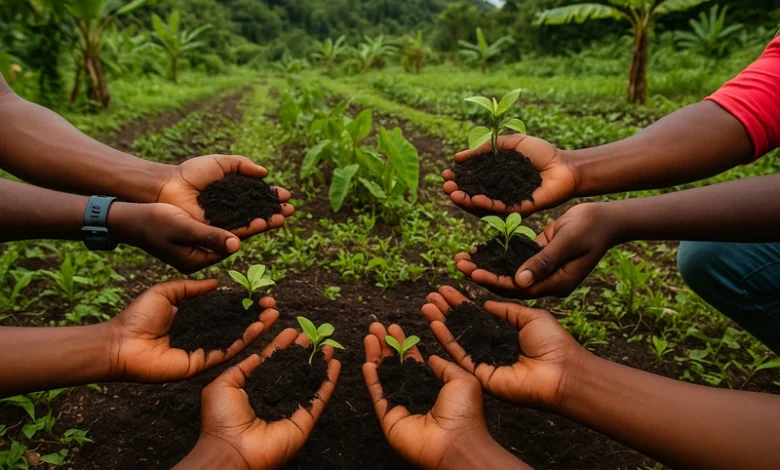National Agricultural Policy and Action Plan

Dominica’s National Agricultural Policy and Action Plan serves as a strategic framework guiding the development and sustainability of the island’s agricultural sector. Recognising agriculture‘s historical and ongoing importance to the economy, livelihoods, and food security, the policy aims to transform the sector into a more resilient, productive, and market-oriented industry. It addresses various challenges, including vulnerability to natural disasters, climate change impacts, market fluctuations, and the need for modernization and increased participation of youth.
The policy is closely linked with Dominica’s broader National Resilience Development Strategy, reflecting the country’s vision to become the world’s first climate-resilient nation. Therefore, a significant focus is placed on integrating climate-smart practices and building resilience into all aspects of agricultural production.
Objectives of Dominica’s National Agricultural Policy and Action Plan
The primary objectives of the Dominican National Agricultural Policy and Action Plan generally include:
- Enhancing food and nutrition security: Increasing domestic food production to reduce reliance on imports and ensure a stable food supply for the population.
- Boosting climate resilience: Implementing measures to protect the agricultural sector from the impacts of climate change and natural disasters, such as hurricanes, droughts, and floods.
- Promoting sustainable agricultural practices: Encouraging environmentally friendly farming methods, including organic farming, soil conservation, and efficient water management.
- Improving productivity and competitiveness: Modernizing farming techniques, adopting new technologies, and enhancing the quality and quantity of agricultural produce.
- Diversifying agricultural production: Expanding the range of crops and livestock produced to reduce dependence on traditional commodities and explore new market opportunities.
- Strengthening value chains and market access: Improving post-harvest handling, processing, and marketing of agricultural products to increase farmers’ income and access to regional and international markets.
- Fostering rural development and creating employment: Generating economic opportunities in rural areas, particularly for youth and women, through agricultural entrepreneurship and related activities.
- Strengthening institutional capacity: Improving the effectiveness of government agencies and farmer organizations in supporting the agricultural sector through better policies, research, extension services, and data management.
Key Areas of Focus and Action Plan
The action plan component of the policy outlines specific strategies and initiatives to achieve its objectives. Key areas of focus often include:
- Infrastructure Development: Investing in critical infrastructure such as resilient farm roads, irrigation systems, post-harvest facilities (packhouses, storage), and processing plants. This is particularly important in the aftermath of natural disasters to restore and enhance the sector’s capacity.
- Technology and Innovation: Promoting the adoption of modern farming technologies, including climate-smart agriculture techniques, improved seed varieties, pest and disease management, and precision agriculture. Digital solutions for data collection, market information, and farmer support are also being explored.
- Capacity Building and Training: Providing training and extension services to farmers and stakeholders on best practices in sustainable agriculture, climate resilience, business management, and value addition. Programs targeting youth and women in agriculture are crucial for the sector’s future.
- Market Development and Access: Facilitating access to domestic, regional, and international markets through improved market information systems, quality standards, certification (e.g., organic), and support for agro-processing and value-added product development. Initiatives like farm-to-table linkages are also being promoted.
- Access to Finance and Investment: Mobilizing financial resources and promoting investment in the agricultural sector through grants, credit facilities, and partnerships with the private sector.
- Disaster Risk Management: Developing and implementing strategies for disaster preparedness, response, and recovery in the agricultural sector, including early warning systems and insurance schemes.
- Research and Development: Supporting research to develop climate-resilient crop varieties, improved farming techniques, and solutions to address specific challenges faced by Dominican farmers.
- Institutional Strengthening and Governance: Improving coordination among government agencies, strengthening farmer organizations, and developing effective policy and regulatory frameworks for the sector.
Challenges and Future Outlook
Dominica’s agricultural sector faces ongoing challenges, including the increasing frequency and intensity of extreme weather events, limited access to finance and technology for some farmers, an aging farming population, and competition in regional and international markets. The successful implementation of the National Agricultural Policy and Action Plan requires sustained investment, strong partnerships between the government, private sector, farmers, and international organizations, and a continued focus on innovation and resilience building to ensure a vibrant and sustainable agricultural future for the island.




